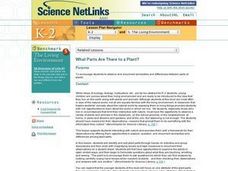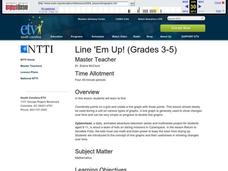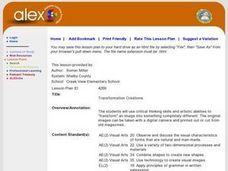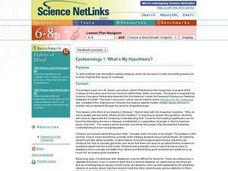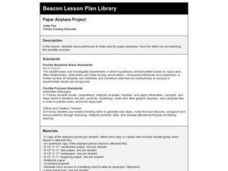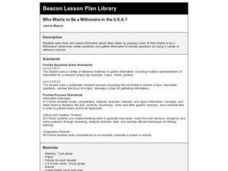Curated OER
Gravity: It's GREEEAAATTT!
Students calculate effects of gravitational force on planets, discuss the effects of weightlessness on the human body and describe and demonstrate how objects in a state of free fall are accelerated by gravity at an equal rate.
Curated OER
Data, Data, Everywhere... and What Am I To Think?
Students demonstrate good random sampling techniques for data collection, select and develop graphic presentations of data and analyze the data to solve a problem presented.
Curated OER
Taking a Stand: Pros and Cons of Forest Fires
Learners explain the components of fire, explain how forest fires impact man and the environment, analyze data in order to recognize areas that are at risk for forest fires, make recommendations based on research.
Curated OER
It's Rainin', It's Pouring
Students take a quick examine part of the water cycle, and the combined gas laws. The instructional activity lead them through the conditions necessary for cloud formation and allow them to create clouds in three different hands-on...
Curated OER
Indian Ocean Explored
Learners examine the rich array of marine wildlife that lives in waters surrounding the Indian subcontinent. They explore the relationships among organisms in coral reefs. They explore environmental dangers to coral reefs and research...
Curated OER
Debate: Is Cheerleading a Sport?
Students research how women are perceived in sports. They debate the issue of whether cheer leading should be considered a sport and are scored on student made rubrics.
Curated OER
Anne Frank: The Island of the Skog
Learners read and discuss The Island of the Skog by Steven Kellogg and examine the illustrations, keep a "discrimination log," and write about one example of discrimination and how they could have intervened to stop it.
Curated OER
What Parts Are There to a Plant?
Students identify and sort plant parts through hands-on activities and group discussions and then work with magnifying lenses and tape measures to document their observations on a student sheet.
Curated OER
Using the Synoptic Code for the Prediction of Weather
Students interpret the synoptic code. They construct a thermoscreen with an anemometer. Students identify different types of clouds and understand and read barometric pressure. Students predict weather pattern as they apply to fronts.
Curated OER
Kid-Created Biographies
Students create biographies on the people they know best-- their teachers! students use various skills to collect information, organize details, publish the biographies and present the information.
Curated OER
Famous Person - Who Am I?
Students have an important historical figure on a card on their back and by giving them clues, students have to determine who they are. In this historical figure lesson plan, students compete to find out who they are first.
Curated OER
What's the Matter? (Experiments)
Students observe a scientific discrepant event, and are then challenged to create experiments to solve the dilemma.
Curated OER
Forming a Code of Ethics
Students discuss and create a code of ethics for their student newspaper.
Curated OER
Severe Weather Action Plan
Students obtain and review copies of school's severe weather action plan (if one exists) and discuss how plan can be used in an actual severe weather emergency; if no plan exists, students develop, write, edit, and present one to school...
Curated OER
Liberty, Equality, Uniformity?
Students examine the French draft law to ban religious symbols from public schools. They research "secularist" and "pluralist" positions regarding this ban, debate the topic in class, and draft a position paper on the ban.
Curated OER
Entrepreneurship: Is it for me?
High schoolers get an introduction to entrepreneurship and business plans in the first lesson plan of this series. They attempt to determine what personal factors to consider in deciding if the time is right to become an entrepreneur.
Curated OER
NEWTON'S 3RD LAW
Learners examine the formal definition of Newton's 3rd law: "forces always originate in pairs, equal in magnitude and opposite in direction." --The informal, qualitative version: "Each action has an equal and opposite reaction."
Curated OER
Line 'Em Up!
Students find coordinate points on a grid and create a line graph with those points. This lesson should ideally be used during a unit on various types of graphs. They make and use coordinate systems to specify locations and to describe...
Alabama Learning Exchange
Transformation Creations
Learners "transform" an image into something completely different using critical thinking skills and artistic abilities. They improve skills in using digital cameras and word processors.
Curated OER
Epidemiology 1: What's My Hypothesis?
Learners demonstrate how descriptive epidemiological clues can be used to make educated guesses as to what might be the cause of a disease.
Curated OER
A Study of Erosion on the Weller School Playground
Students study an erosion problem which existed on the school playground from as many points of view as possible. The ultimate aim is to suggest and encourage implementation of a plan to prevent further damage to the playground.
Curated OER
Dreaming to Come to America
Students examine reasons for immigration to America, including economic, political, and religious considerations, and conduct research to determine immigration history of students' families and compare reasons other groups have come to...
Curated OER
Who Wants to Be a Millionaire in the U.S.A.?
Students research the states, gathering information and creating questions and answers. They play a form of Who Wants to be a Millionaire? using the student-generated questions and answers.









